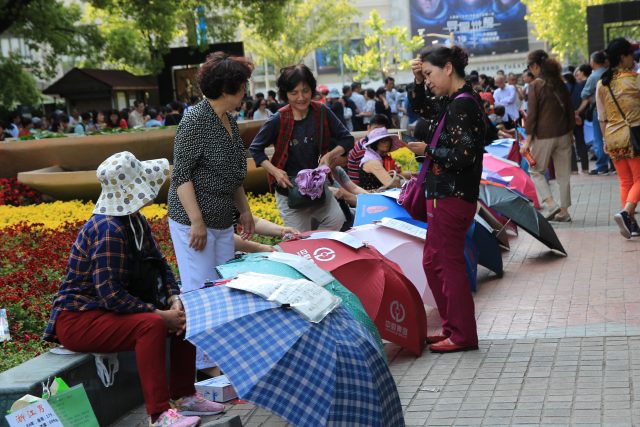The concept of marriage, seemingly individualistic in outlook, has more often than not served as a tool to propagate and preserve a people and their culture.
After all, the family is the basic unit of society.
However, for varying reasons, finding the “right” life partner has proven, in most cases, to be a challenge for millions of people around the world. It is so big an issue that it spurned off a phenomenon known as “Marriage Markets” in China.
Just like your typical neighbourhood market, the Marriage Market hosts people who congregate to advertise and peruse their “products.” But unlike your typical market, these “products,” so to speak, are unmarried sons and daughters.
Every weekend, at popular public places such as the People’s Park in Shanghai and at several parks and other public places in Beijing, concerned parents (and sometimes grandparents) congregate to advertise and scout out potential spouses for their unmarried children.
Typically, parents post sheets of paper detailing their child’s eligibility as a potential spouse and the qualities a prospective son- or daughter-in-law should have. According to a 2018 survey of the Shanghai Marriage Market, some of the qualities include;
Age:
When stating their preferences for potential spouses, the majority of men were seeking younger women, while women preferred someone closer to their own age. Most of the advertisements are for people aged 25-30.
Education and employment status:
Job and education are two of the essential pieces of personal information every advertisement lists. According to the survey, the dating pool was highly educated, with two-thirds of both men and women having attained a bachelor’s degree or higher. Among those who stated an educational qualification for potential spouses, a majority of women were seeking a partner with a similar level of education, while men preferred slightly less accomplished partners.
Ownership of significant assets:
Marriage market advertisements often highlight asset ownership. A man is expected to be able to provide a car and a house before getting married. Those who do own their own car and house are considered more desirable than those who don’t.
Zodiac year & astrological sign:
It is not uncommon to see advertisements that list requirements relating to the Chinese zodiac year and Western astrological sign of potential partners. Traditionally, people born in different zodiac years were thought to possess certain personality characteristics that made them more or less compatible with those belonging to different animal signs. The parents often tape these personal advertisements to umbrellas, which serve as makeshift stands. Then, they chat with other parents to arrange blind dates between their children.
The missing women and the leftover women
China’s largest marriage market is held on Saturdays and Sundays in Shanghai’s People’s Park. The market arose organically in 2004.
The phenomenon can be attributed to several major factors; a severe gender imbalance, deep anxiety felt by parents and a wave of emancipated women with a different marriage ideology.
China is facing a serious gender imbalance, a byproduct of the now-defunct one-child policy which China implemented from 1979 to 2015. Due to the strict family-size limitations and a preference for sons, there is an unusual shortfall of the female population, often termed as the “missing women of China”.
According to data from China’s National Bureau of Statistics, the male population exceeds the female population by more than 30 million. As a consequence of the one-child policy, men of marriageable-age known as guang gun (光棍), translated as “bare branches” or “bare sticks”, live in societies where marriage is considered as part of an individual’s social status.
The marriage ideology is also shifting for many young women in China. Highly educated, high-earning women in the country are in less of a hurry to get married. They have more options than women in past generations and are not afraid to put their careers first.
Ironically, women who remain unmarried in their late twenties and beyond, despite their high incomes and educational attainment, are stigmatised as 剩女 (shèngnǚ, “leftover” women), and are even urged to lower “unrealistic” standards during their search for a partner.
One of the consequences is the marriage market, where many parents who are eager to marry off their children advertise them at the market, often without their consent.



